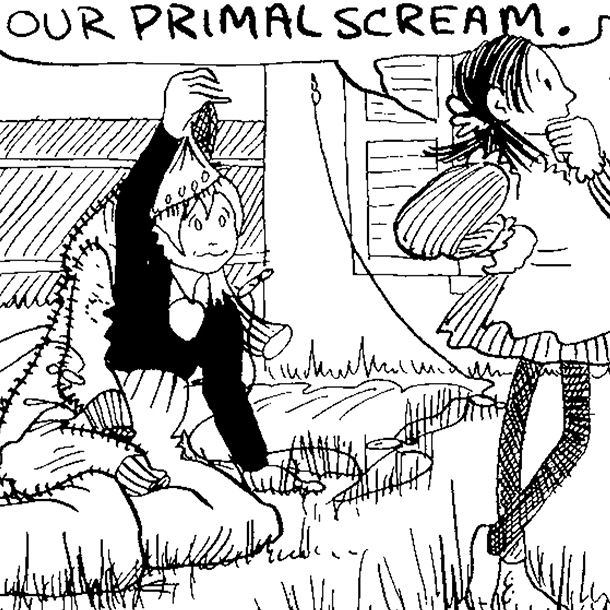Trots and Bonnie
Shary Flenniken
New York Review Books, $39.95 (cloth)
In the years between the shootings at Kent State and the collapse of the South Vietnamese army, a sort of pause obtained in the United States, at least in some parts, and in some ways of living, fighting, and dreaming. In San Francisco, 1971, a group of cartoonists—Dan O’Neill, Bobby London, and Gary Hallgren—created an underground comic called Air Pirate Funnies in which Disney characters engaged in sex, drugs, and revolution. When, unsurprisingly, Disney sued, the gang began creating new characters of their own, like Bobby London’s cigar-chewing Dirty Duck, and figures drawn from the history of American hilarity to illustrate the American dilemma. The cadre soon included Shary Flenniken, who’d met the principals at the Sky River Rock Festival in Washington and collaborated with them on a special Sky River Funnies comic.
On the other side of the nation then was Robert Crumb and what might be called the New York School of funnies, more violent and “transgressive” (the welcome word) than the West Coasters; Shary Flenniken disliked them for their “anti-woman” stories. In 1972 Deep Throat opened in a regular Broadway movie theater, a silly film that nevertheless upended the rules of public display just as underground clubs such as the Ramrod and the Anvil were making real the images of kinky artist Tom of Finland. Golden Age porno The Devil in Miss Jones (1973); the skits on Saturday Night Live’s first season in 1975; and periodicals such as the National Lampoon, Rolling Stone, the East Village Other, and ZAP Comics are among the stuff the next decades would come to deplore but which seemed then to be simply crazy-joyful.
Back on the West Coast, Flenniken had begun to publish her comic Trots and Bonnie in the National Lampoon and her followers increased quickly (“Suddenly your voice is a lot louder,” she notes). It was then and remains unique: a comic about a thirteen-year-old suburban girl, her wild and crazy girlfriend, and her talking dog, who often gets the last and best lines, at once witty and wise. Bonnie has blank oval eyes like Orphan Annie’s and a nest of yellow hair, her permanent baggy white trousers tied high like a cabin boy on a pirate ship. Her daring friend Pepsi is smaller, in a frock and a white pinafore and black stockings, like a child out of a good-good girl story of long ago. Trots is a dog, a male, who now and then changes size slightly but noticeably, and can be heard only by Bonnie.
In their original context, the strips would have come to readers and fans only once a month via the Lampoon, but in the new complete collection from New York Review Books, they follow fast on one another, adventures and misadventures, mistakes about life, sudden insights too, and dangers that their parents would have saved them from and scolded them for, if they’d known about them. Most of those adventures turn on sex, common enough even then, but in a way that no other episodic comic I know of did, and hasn’t since.
The first comic in the anthology is a pre-Lampoon strip in which Bonnie is kicked out of the house by an angry parent: “And don’t come back til yer wearin’ a BRA!” Bonnie tries a hankie as a stand-in, but the parent tosses her out again, tossing also her copy of Shulamith Firestone’s 1970 feminist treatise The Dialectic of Sex. “Where to now? O’ Hope of the world,” Trots remarks. This first bow appeared in the Air Pirates comic Merton of the Movement (with a title and lead cribbed from a1947 Hollywood comedy Merton of the Movies), before the Lampoon took her on. The finish wasn’t high, but it augured well for the future. The lumpish parent in this early instance would evolve into a standard sixties’ Mom and Dad, less violent but just as controlling. Pretty soon the neighborhood is upscale, and Bonnie meets Pepsi, who coaches her on how to get rid of the dumb, hairy local perv, whom Bonnie’s has just escaped. “Maybe we should work on our Primal Scream,” Pepsi notes—though she then illustrates the most important technique, a backward kick to the privates that does the creep in.
Pepsi also guides Bonnie into female mysteries: “I just had my first Pelvic Examination!” she tells Bonnie, and explains in detail. “Did’ja PASS?” Bonnie asks, and when Pepsi takes her to the Free Clinic to get her birth control pills, she’s disappointed that Bonnie gets nothing from the doctor—not an exam, a blood test, a vasectomy? “He said I should come BACK when I start having PERIODS,” says Bonnie.
I worry a little bit how Bonnie’s adventures, now nearly fifty years old, are going to read today when this large volume hits bookstores and Amazon. Young girls now are wise about many things and eager to learn more (even if their sources, such as Twitter and Instagram, are often suspect), while Pepsi and Bonnie have only a couple of books and a few human bodies, including their own, to learn from.
When Pepsi plays doctor, preparing to do a vasectomy with a pair of garden shears on a pliant neighbor kid, Flenniken adds the marginal annotation to this edition: “Everybody knows we only play doctor to get our friends to take off their clothes, right?” Both boys and girls in Trots and Bonnie readily get naked, and though they have goals and limits, the moment can get out of hand.
The wildest page in their early adventures has to do with Girl Scout cookies. The two girls go from house to house and consistently strike out—women won’t buy cookies full of preservatives, or they don’t consume sugar, or decide the girls are fronting for the FBI. But one weird man in a track suit, living alone, closely resembling Jeff of Mutt and Jeff, wants to buy plenty—but first the girls have to take off their clothes, stuff cookies in their mouths, jump up and down, enter a steamy bathroom, etc. There’s no hint that he grabs or handles the girls, and in the end they’re very pleased—he’s bought all their cookies! For all their growing smarts, Pepsi and Bonnie seem never to have encountered the term “pedophile,” and for the most part have no need to know.
The distinctions of penis length to be found on eighth-grade boys is of more interest to the eighth-grade girls down at the Y pool: “I wish we could just ask them ‘Hi! Do you have a big penis?’ Does that sound cute and perky. . . ? It’s just so horrible to go for a feel and find out there’s hardly anything to get a hold of. . . .” But Pepsi wants to talk about a boy’s ability to express his feelings. She’s picked a large quiet guy with “the smallest rod in the eighth grade—and I love him.” It seems certain that Flenniken heard, and joined, conversations just like this in the eighth grade, and remembers them all.
Long ago W.H. Auden applied an important distinction to the universal dream of the Happy Place, where suffering and evil are unknown. Such places are of two kinds, he says: Eden and Utopia. Eden is a past world that can’t return, Utopia is a future world that can’t be built. Eden, if it could have persisted, would be a place where all the inhabitants may do whatever they want to do—which is where Trots and Bonnie live. Utopia is, or would be, a place where all the inhabitants like to do what they ought to do, which Trots and Bonnie don’t. This has nothing to do with morality: an inhabitant of Eden is required only to be both happy and likable; an inhabitant of Utopia must be both happy and good.
It’s obvious that many peoples and neighborhoods, towns and countries, are covered by both of these commandments, and the inhabitants often believe that they follow one while actually being governed by the other. The only undivided country is uncommon and momentary: those childhoods that somehow for a time are allowed to be both lucky and good, which have defeats and accidents but never really sin.
Since Pepsi, Trots, Bonnie, and their pals have lived now for years in exactly that country, they know more at the end than they did when they began, and they look almost the same; but in the last pages included in this remarkable book they are wiser, even wised up, and the doors seem nearer to closing behind them, as they closed for Adam and Eve: The world was all before them, where to choose Their place of rest, and Providence their guide: They, hand in hand, with wandering steps and slow Through Eden took their solitary way. Both of them, and then the rest of us: to say nothing of the dog.






